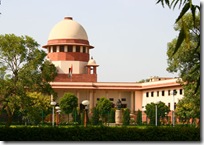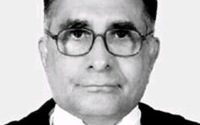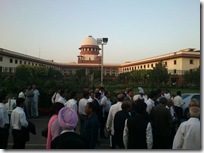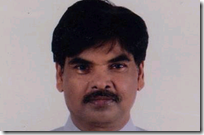The Bench and the Bar
Bar, Bench & Litigation
The Central Bureau of Investigations (CBI) has removed one of its public prosecutors on the 2G spectrum scam case, after taped phone conversations allegedly showed him giving advice to one of the accused in the matter.
Bar, Bench & Litigation
 Only 66 candidates out of approximately 466 candidates enrolled to take the Supreme Court’s Advocates on Record (AoR) exam in June 2012 have passed, according to a notification posted on the Supreme Court’s website.
Only 66 candidates out of approximately 466 candidates enrolled to take the Supreme Court’s Advocates on Record (AoR) exam in June 2012 have passed, according to a notification posted on the Supreme Court’s website.
Bar, Bench & Litigation
Breaking: Several sources have confirmed that Supreme Court additional solicitor general Mohan Parasaran will replace outgoing solicitor general of India Rohinton Nariman who resigned on Monday.
It is understood that Parasaran received a telephone call from a senior government official today offering him the appointment today, which he orally accepted.
Tax Sutra's Arun Giri first broke the story earlier today, citing sources [story, behind paywall].
Parasaran is the son of former attorney general of India and senior advocate K Parasaran. He was designated a senior advocate in 2002, and was first appointed an additional solicitor general in the Supreme Court in 2004.
Nariman had resigned from the office on Monday allegedly over difference of opinion with the law minister Ashwini Kumar. Legally India Supreme Court postcard writer Courtwitness tweeted: “[Rohinton F Nariman], from what I gather, did not like being ordered around by someone whom he does not think is as good a lawyer as him.”
SCOI Reports
 At precisely 10.30am on 28 September 2012, a packed courtroom rose in the Supreme Court of India’s Chief Justice’s Court, as chief-justice-designate Altamas Kabir and former chief justice of India (CJI) Sarosh Homi Kapadia – a little behind him - walked in to preside together in this court for the first and the last time.
At precisely 10.30am on 28 September 2012, a packed courtroom rose in the Supreme Court of India’s Chief Justice’s Court, as chief-justice-designate Altamas Kabir and former chief justice of India (CJI) Sarosh Homi Kapadia – a little behind him - walked in to preside together in this court for the first and the last time.
Bar, Bench & Litigation
Supreme Court judges P Sathasivam and JS Khehar yesterday justified awarding the death penalty to the murderer of a seven-year-old boy, on the ground of his gender among other “aggravating circumstances”. Killing the sole male child of a family meant the lineage could not be carried forward, reported the Times of India.
The bench said:
The parents of the deceased had four children — three daughters and one son. Kidnapping the only male child was to induce maximum fear in the mind of his parents. Purposefully killing the sole male child has grave repercussions for the parents of the deceased…
Agony for parents for the loss of their male child, who would have carried further the family lineage, and is expected to see them through their old age, is unfathomable. Extreme misery caused to the aggrieved party certainly adds to the aggravating circumstances.
The accused lured the victim, whom he knew, away after school under some pretext, kidnapped him and called his house for ransom. After a delay in being provided the money he strangled the boy stuffed him in a gunny bag and dumped him in a water tank.
Bar, Bench & Litigation
Recently-elected Supreme Court Bar Association (SCBA) president and senior advocate MN Krishnamani has vowed to file cases for his digital-artist son Anirudh Krishnamani against the Karnataka state government and a Bangalore art gallery, which withdrew the son’s exhibited paintings on the direction of the city police.
The police had taken cognisance of an oral complaint by Bharatiya Janata Party (BJP) state media coordinator A.L. Shivakumar about the paintings depicting goddesses Kali, Mohini and Shiva-Sati in the nude.
Krishnamani Jr said:
This action of the police is completely against the fundamental rights enshrined in the Constitution. [Kali] is called Digambara, which means clad in space or, in other words, naked. [Mohini] is the goddess of seduction. She is supposed to look seductive.
He said the painting depicting Shiva-Sati kissing in each other’s embrace, “was inspired by Kalidasa’s Kumarasambhava. Anybody who has read this text will know that it is far more graphic in its description of the Shiva-Parvathi union than [the painting]”. [The Hindu]
Bar, Bench & Litigation
 Breaking: Alleged proclaimed offender and Andhra Pradesh high court (HC) judge NV Ramana will continue as a judge in that HC, after the Supreme Court (SC) today dismissed the petition challenging his appointment and imposed costs on each of the petitioners.
Breaking: Alleged proclaimed offender and Andhra Pradesh high court (HC) judge NV Ramana will continue as a judge in that HC, after the Supreme Court (SC) today dismissed the petition challenging his appointment and imposed costs on each of the petitioners.
Bar, Bench & Litigation
Rohinton Nariman, the solicitor general who had succeeded Gopal Subramanium in July 2011, resigned today according to the Times of India and IBN Live.
According to both TOI and IBN, the reasons behind the resignation are “not known yet”, though IBN citing “sources” wrote that “there were differences of opinion between Nariman and Law Minister Ashwani Kumar”.
Nariman is the son of former additional solicitor general of India Fali S Nariman who in 1975 resigned from his post protesting the imposition of a constitutional emergency by then prime minister Indira Gandhi.
Legally India Supreme Court postcard writer @Courtwitness1 tweeted:
“This has got to be a record of some sort... Two SG s quitting in succession, midway through their terms!”
“Rumour was that he wasn't particularly happy with the way govt litigation was being run. Not sure if that's proximate cause as well.”
@arungiri tweeted: “Lets start the prediction game on who ll be new SG.. my prediction - [Mohan] Parasaran… What say”
Bar, Bench & Litigation
The criminal charges against Bollywood superstar Salman Khan have been increased to culpable homicide by the Bandra metropolitan magistrate, the Mumbai Mirror reported today.
The paper also included a good potted history of the more than 10-year-long trial against the actor who allegedly killed a number of pavement dwellers in Mumbai driving while intoxicated. [Mumbai Mirror]
Reportedly the case was used by arguing counsel in another drink driving case in 2010 to avoid the culpable homicide charge.
Bar, Bench & Litigation
Former chief justice of India (CJI) SH Kapadia was yesterday appointed the Bombay Stock Exchange’s (BSE) public interest director, four months after he retired as the CJI.
The Securities Exchange Board of India (SEBI) nominated him to the post.
Kapadia dealt with matters under the SEBI Act 1992, the Companies Act 1956, the RBI Act, mergers and acquisitions, the Banking Regulation Act, taxation, the Information Technology Act 2000, and validity of the Indian Accounting Standards during his stint as a Supreme Court judge from 2003 onwards. [Business Standard]
According to several authoritative sources, Kapadia is also understood to have taken chambers in the offices of Gagrats in Mumbai; he started his legal career at the firm's precursor, Gagrat & Company.
Bar, Bench & Litigation
 The New York Times’ India Ink blog has interviewed the Bar Council of India (BCI) chairman Manan Kumar Mishra who said that around 4,000 complaints were pending with the BCI, which is the state bar councils’ appellate body for disciplinary cases, while around 1.7 million lawyers were enrolled.
The New York Times’ India Ink blog has interviewed the Bar Council of India (BCI) chairman Manan Kumar Mishra who said that around 4,000 complaints were pending with the BCI, which is the state bar councils’ appellate body for disciplinary cases, while around 1.7 million lawyers were enrolled.
Bar, Bench & Litigation
The total number of high courts (HC) in India rose to 24 after the north-eastern states of Manipur, Tripura and Meghalaya each inaugurated their own.
Including the chief justice, Tripura will have four judges. Meghalaya and Manipur will have three judges each, according to The Hindu.
Himachal Pradesh HC judge Deepak Gupta will head Tripura, Patna HC judge T Meenakumari will head Meghalaya, and Chhatisgarh HC judge AM Sapre will head Manipur.
Three high courts will also see new chief justices presiding: Madras HC will soon be headed by Justice RK Agrawal – presently in Allahbad HC; Madras HC judge S Nagappan will be the new chief justice of the Orissa HC; and Gujarat HC judge DH Waghela will be the chief justice of the Karnataka HC. [Hindu]
Bar, Bench & Litigation
To make public prosecutors eligible for district judiciary posts, the Supreme Court said they would be treated as advocates, despite the Bar Council of India’s (BCI) prohibition against lawyers who are full-time salaried employees from practising as advocates.
Rule 49 of the BCI’s rules on professional standards provides:
An Advocate shall not be a full-time salaried employee of any person, government, firm, corporation or concern, so long as he continues to practise and shall, on taking up any such employment intimate the fact to the Bar Council on whose rolls his name appears, and shall thereupon cease to practise as an Advocate so long as he continues in such employment.
The bench, led by justice RM Lodha, partially negated this requirement and said:
The factum of employment is not material but the key aspect is whether such employment is consistent with his practising as an advocate. Or, in other words, whether pursuant to such employment, he continues to act and/or plead in the courts. If the answer is yes, then despite employment he continues to be an advocate.
The SC was deciding appeals filed against the orders of the High Court of Punjab and Haryana which had quashed the appointments of certain additional district and sessions judges on the basis of rule 49 in May 2010. [Indian Express]
Bar, Bench & Litigation
Proclaimed offender and Andhra Pradesh High Court (AP HC) judge N Venkata Ramana may continue as judge even after his recommended removal by the Chief Justice of India, if the Parliament does not initiate his removal, attorney general GE Vahanvati told the Supreme Court.
An arson case was filed against Venkata Ramana prior to his appointment at the AP HC, and he was declared a proclaimed offender. A petitioner, through senior advocate Shanti Bhushan, approached the SC for quashing his appointment, in light of the pending criminal case against him.
Vahanvati told a bench of Justices Aftab Alam and Ranjana P Desai that once a Judge has been appointed, the parliament is the sole authority to initiate his removal as:
The Constitution makers were clear that Judges of higher judiciary needed to be protected to uphold the higher principle of judicial independence.
Removal is the only process recognized by the Constitution to maintain independence of judiciary. Hard cases and harsh facts involving a particular person make no difference to the higher principle.
Venkata Ramana’s name was dropped twice from being considered by the collegium of judges appointing high court justices. It was on erstwhile law minister Ram Jethmalani’s insistence that the collegium was persuaded to reconsider his name. [TOI]
Legally India Supreme Court Postcard writer Courtwitness tweeted: “An appointment which is invalid (say eligibility criteria like citizenship found not fulfilled) can always be quashed by courts. Removal is only for valid appointment upon finding of "misbehaviour". A. 124 for SC/217 for HC judges.”
Bar, Bench & Litigation
The law ministry approved Rs 80 crore for recruitment of 2,000 new subordinate judges across the country, to be deployed in fast track courts. The ministry had discontinued the fast-track courts scheme in March 2011 after running it for 11 years.
On 9 January the law ministry wrote to all state governments asking them to increase the strength of the subordinate judiciary from 18,000 to 20,000.
Currently, there are more than 3.2 crore pending cases in Indian courts. Of this, at least 2.76 crore cases are pending in subordinate courts while 44 lakh are pending in various high courts. [TOI]
Bar, Bench & Litigation
The Bar Council of India (BCI) launched an advocates pension scheme under which all advocates in Bihar with at least 30 years of practicing experience will get a monthly pension of Rs 5000, even if they are above 65 years of age.
To avail the benefit of the scheme, advocates under the age of 30 years will have to deposit a one-time fee of Rs 7,000, and those above the age of 30 years will have to deposit Rs 10,000 once with the BCI, as well as regularly purchase the BCI’s journals. [UNI]